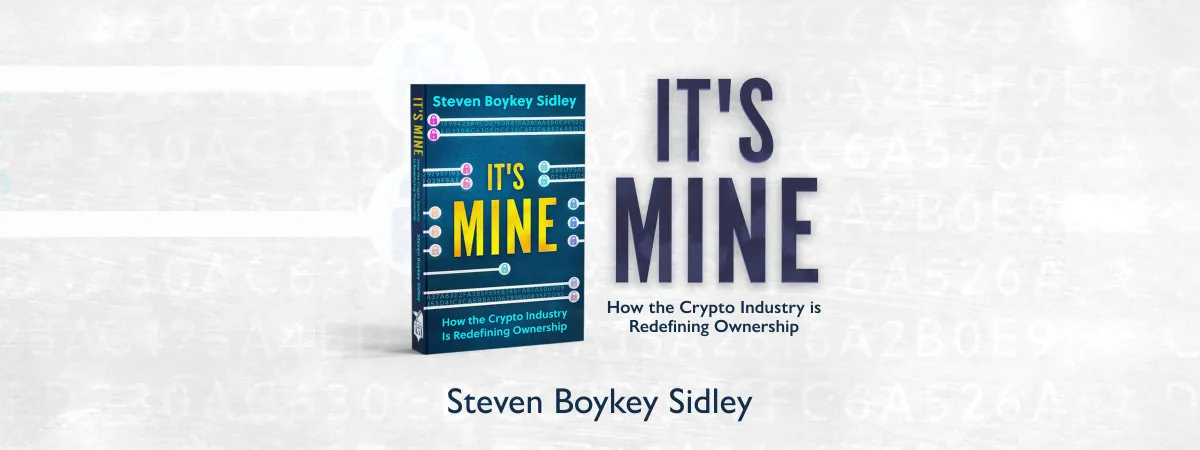GUEST ESSAY
Ownership, aviator shades and the threat of violence

A new paradigm of ownership has arrived that requires no third-party custodian or issuer or attestor or transactor at all, and it will seep into everything you do and everything you are over the next 10 years.
I have a book coming out in stores this week, so a little reflection (and perhaps a little PR) is due. It is being published by Daily Maverick’s book publishing division Maverick451 in South Africa and the Legend Times Group globally.
Those of you who have read my columns know that I am more than a crypto enthusiast; I am more like a pestering evangelist about what I see as one of the most important technologically fuelled developments in decades. Perhaps more than that — it is something that will have an immeasurable and permanent impact on all our lives, sociologically, politically, financially and legally.
It is hard work to convince people of this, with many rolled eyes and sceptical eyebrows coming my way, as we shall see.
First, the title: It’s Mine: How the Crypto Industry is Redefining Ownership.
The genesis of this book harks back to an incident that happened when I was a teenager. I was given leave, together with a bunch of my 15-year-old friends, to go on our first holiday alone. To Durban, as it was called then. On a train. We were deposited at Park Station in Johannesburg, given some pocket money and waved off by our anxious parents as we headed to a beachfront hotel. To say that we were excited at the prospect of our first strike at independence would be an understatement.
We were in a sleeper compartment. My mother had bought me a pair of zooty sunglasses for the trip. I loved those sunglasses. They made me look like an aviator. Cool. Adult. Sexy, in my imaginings.
Soon after departure we met our next-door neighbours. Four boys. Older, perhaps 18. They were toughs. From the “south” of Johannesburg, a feared place. But they liked us and adopted us, and we all squeezed into their compartment and listened to their stories of bravado — fights, drinking, joints, cars and girls.
The next morning, I went into the corridor of our carriage and greeted one of my new best friends who was standing by the window smoking. The biggest and meanest of them.
He was wearing my sunglasses.
After the shock wore off, I stammered — Oh, did I leave my sunglasses in your cabin last night? Nah, he said evenly and menacingly. These are mine.
And that was that. Something I thought I owned had been seized, backed up by the threat of violence. I never really owned those sunglasses at all; I had no proof and no redress.
Taxonomy of ownership
My book is about ownership. Where it arose in history. What societal and political models have arisen to protect it, manipulate it, ensure it, abuse it. And why the emergence of a deep-in-the-weeds mathematical oddity called asymmetric cryptography will utterly upend the entire edifice of ownership — not only currencies, not only digital assets, but the real physical stuff of our lives too.
In preparation for this book, I dived into the academic literature on ownership, of which there is an Alexandria Library’s worth. One article jumped out at me. It was by Tilman Hartley, a sociologist from the University of Bristol, who wrote a paper entitled The Continuing Evolution of Ownership.
In it, he describes a taxonomy — first, the original shared ownership that existed in tribal societies, where the meat from the hunt was shared to keep the tribe healthy enough to ward off threats from man and animal alike. Thereafter, as we settled into communities, command ownership, whereby a small majority accrues or seizes power. The headman, the monarch, the emperor, the dictator, the feudal lord grabs ownership for himself, doling out just enough bread crumbs to keep everyone else working for his benefit (think North Korea today).
And this has evolved into where most of us live now, into the world of “title” ownership. Almost everything we own is attested to, sometimes issued by and sometimes in the custody of trustees. The title to your house (attested to and issued by a municipality), the registration for your car (attested to and issued by a government department), the receipt for your laptop (attested to and issued by the computer store), your ID (in the custody of and owned by Home Affairs, even if you have your little plastic card), your money (it does not belong to you — it is an IOU — it can and has been taken away or devalued at will by government institutions).
Not only that, we pay people to take possession of the stuff that we think we own and we pay them to move it on our behalf. Banks, lawyers, accountants.
In fact, you actually own very little, and that harsh fact only whumps you upside the head when an item is lost, stolen, seized or forged. It is not fun to have to prove and repossess what you thought was yours, and often it is not possible (the original owners of the 500 hijacked buildings in downtown Johannesburg will be nodding their heads vigorously, especially in the light of the recent tragedy there).
A new paradigm
Crypto and its blockchain harness will change all that. A new paradigm of ownership has arrived that requires no third-party custodian or issuer or attestor or transactor at all, and it will seep into everything you do and everything you are over the next 10 years until it is as ubiquitous as all the other technologies that you could not do without but never notice. I am not talking about cryptocurrency here, about which most people have read and have an opinion. I am talking about a much broader church of cryptography-fuelled magic which will appear everywhere we seek to protect value.
So why has it been so difficult to convince people of crypto’s future importance with regard to the public good?
I believe that what is presented in the press are the things that attract attention — the scams, the grifters, criminals and hucksters, the shrieky regulators, the alarmists and doomsayers representing powerful interests, misinformation about energy wastage, fortunes made and lost and annoying crypto bros.
It’s titillating to read, but you will struggle to find a lot of content in the mainstream press about how and why this new technology will make a positive difference to your life.
It’s all in this book. Without any technical jargon.
I promise. DM
Steven Boykey Sidley is a professor of practice at JBS, University of Johannesburg. His new book It’s Mine: How the Crypto Industry is Redefining Ownership is published by Maverick451. It can be ordered directly from the DM store here or on Kindle. It’s also available at bookstores.



















Yeah, right.
And in a couple of years with quantum computing we will go back to hard evidence as blockchains will no longer be impregnable.
No doubt. But without societal trust, the rule of law, impartial means of enforcement etc. (i.e. the basics of a functional modern economy and society), none of this technical innovation will change anything.
Thanks, waiting for my copy of the book. I see (in my limited experience and knowledge) that crypto should be embraced as just another tool to enable us to stay current with tech advances. We can always stay with paper, but at our own peril.